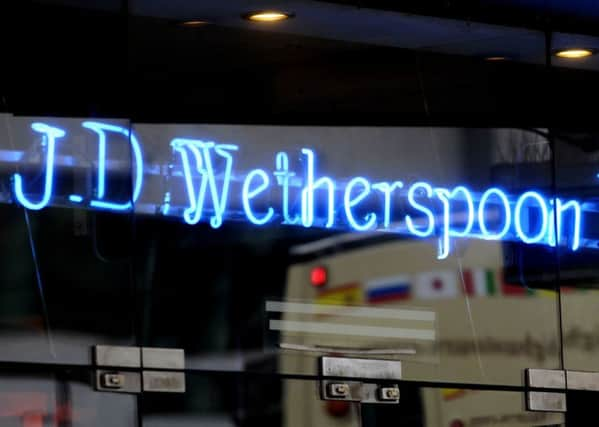Wetherspoon chief criticises living wage plan


Wetherspoon chairman Tim Martin yesterday rounded on the Chancellor’s Budget announcement of a compulsory living wage of £7.20 an hour for over-25s from April next year, rising to £9 by 2020.
He said the plans would see pubs put at an even greater disadvantage compared with supermarkets, as the industry already shoulders significant staff costs.
Advertisement
Hide AdAdvertisement
Hide AdThose costs make up around 25 per cent of every pint sold for an average of £3 in pubs, according to Wetherspoon, which has more than 930 pubs, including Edinburgh’s Standing Order and the Counting House in Glasgow.
But the firm estimates that staff costs only make up 10 per cent of a pint sold for less than £1 in supermarkets, meaning the increased wage bills from the living wage would hit pubs with “far greater force”.
In a trading update revealing soild sales growth but tighter margins, Martin warned: “The recent government announcement regarding the ‘living wage’ adds considerable uncertainty to future financial projections in the pub industry.
“Pubs contribute around 40 per cent of sales as taxes of one kind or another and are important generators of jobs.
“Capricious initiatives by the government, widening the financial disparity between pubs and supermarkets, will threaten the future of many more pubs.”
He added: “Wetherspoon is conscious of the need to attract and retain excellent staff. In addition to a 5 per cent minimum starting-pay increase announced last October, we agreed an 8 per cent increase for the 3 August this year, before the government introduced its latest plans.
“We also pay approximately one third of profits to staff in bonuses and free shares and 80 per cent of this is paid to staff who work in our pubs.”
The group, which has flourished on the back of its offering of low-cost drinks and all-day food, posted a 2.9 per cent rise in like-for-like sales in the 11 weeks to 12 July, while total sales rose 6.5 per cent.
Advertisement
Hide AdAdvertisement
Hide AdThe firm’s operating margin fell again to 7 per cent, due to higher costs and cut-price breakfasts and coffee deals. It guided to a full-year operating margin of 7.4 per cent, down from as much as 10.2 per cent in 2009.
But it confirmed expectations for full-year pre-tax profits to remain flat, with the City looking at a figure of about £80 million.
Investec analyst Alex Paterson said: “We suspect that higher wages not only to JD Wetherspoon’s staff, but also more widely for other workers from the subsequently announced living wage, will boost spending in JD Wetherspoon’s pubs. We doubt we have captured this potential upside and therefore reiterate our ‘add’ recommendation.”
There are mounting fears over the impact of the living wage in sectors that already face high staff wage bills, such as pubs, retailers and care homes.
Shares among retailers were sent reeling immediately after the Budget last week as investors feared the impact on results of increased costs, while experts have since warned over higher prices for consumers as firms seek to pass on the burden.
Wetherspoon has been a vocal critic of unfair taxes in the pubs sector, arguing that supermarkets do not have to pay VAT on food sales and are effectively able to subsidise alcohol prices.